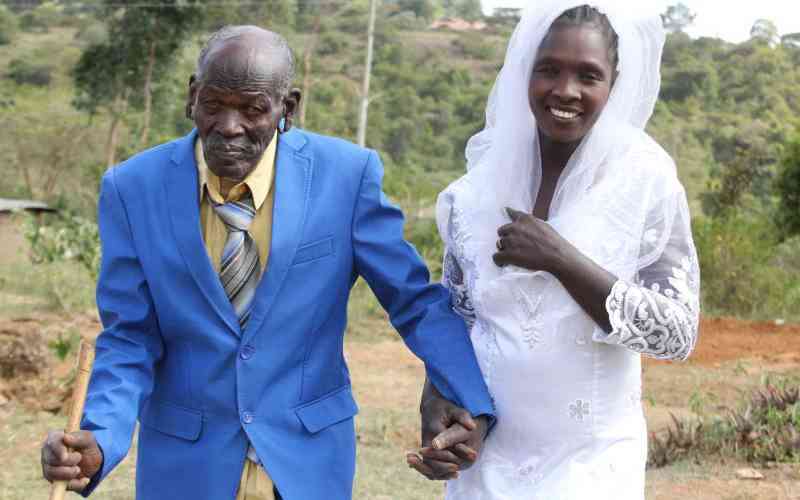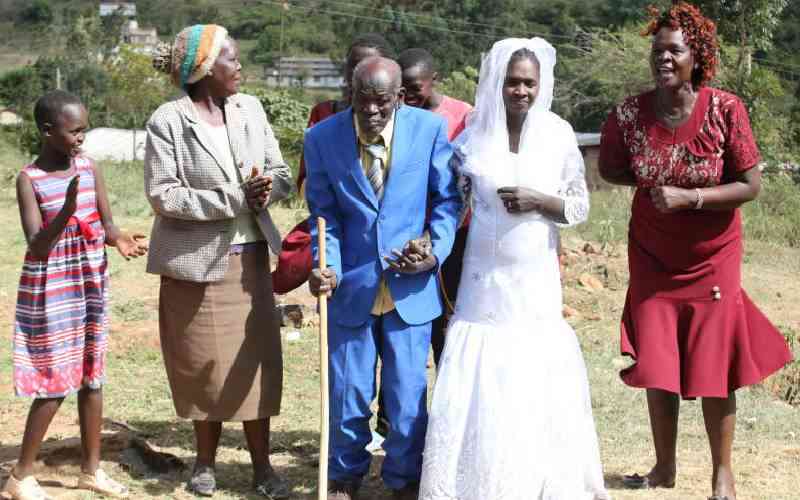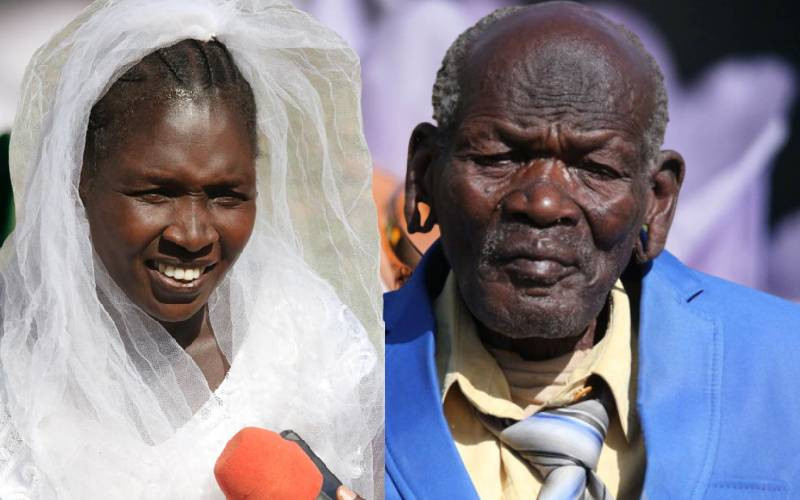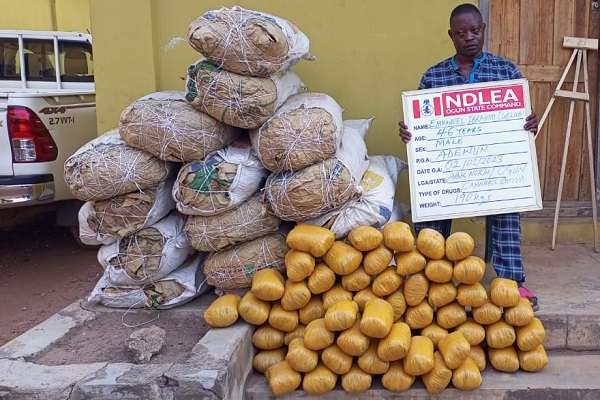Before life in captivity became their new normal, they used to write English essays about the day they would never forget, but they had no inkling that the day was yet to come. Gunshots and shrilling cries of children rent the air on June 17, 2021 — a day that has become permanently etched in the memories of students of Federal Government College (FGC) Birnin-Yauri, Kebbi state. The bright sunny morning morphed into a total eclipse.
While the senior students were in the hall writing their final national examination, hundreds of armed bandits surrounded the outer fence of the mixed boarding school. Residents of nearby settlements took to their heels. By 12 pm, some of the bandits arrived at the school gate on their motorcycles with a bus in tow. When the security guards refused to open the gates, they opened fire and broke into the school compound. The few police officers on duty were overpowered. One of them was killed. Then, the operation began.

The school gate | Photo Credit: Taiwo Adebulu/TheCable
There was no means of escape. Students climbed into the ceilings to hide, some ran towards the staff quarters. During the reign of terror, the bandits shot a girl in the lap, one in the shoulder, and another killed. The bandits asked Yar Mama Martha, the matron, to take them to the girls. She resisted and was beaten to a pulp. The girls that were captured were taken to the new hall, which had already been riddled with bullets.
“Before the attack, the bandits sent a letter to the girls’ hostel on June 10. We didn’t know the person that brought the letter. The girls were questioned, but none of them owned up to it. The bandits attacked a week after and it was the exact day they stated in the letter,” an official of the school, who preferred to be anonymous as he was not authorised to speak on the matter, told TheCable.
“They came through the Kimo forest, which shares a boundary with Zamfara. When they got to the gate — more than 300 of them — they relaxed and took some opioids and sachets of water to get high. The operations lasted for about two hours. They packed most of the students into the long bus; they put others on their motorcycle – four of them on a motorcycle, two bandits, two students.”
A long earthen wall reportedly built in times of yore by the queen warrior, Amina of Zazzau, to fortify her ancient kingdom sits right in front of the school, concealing it from the outside world. But it could not save them from the marauding invaders. The bandits carted away over 112 students and eight teachers.

The hall where the senior students were writing their national examination | Photo Credit: Taiwo Adebulu/TheCable
News of the abduction spread like wildfire, from Birnin-Yauri to Binin-Kebbi, the state capital, Niger state, Zamfara and adjoining villages where the students lived. Parents trooped to the school immediately in search of their children. Those who were lucky to meet their children took them away. Others slumped against the dusty ground and cried. Not even words of assurance from Atiku Bagudu, the state governor, who visited the school on the day of the attack, could console the dejected parents. When the dust finally settled, the once bustling FGC Birnin-Yauri turned into a ghost town. The government subsequently ordered the closure of the school.
The mastermind of the attack is believed to be the most-dreaded bandit kingpin affiliated with Boko Haram and the Islamic State’s West Africa Province (ISWAP). Abubakar Abdallah, commonly known as Dogo Gide, needs no introduction. His name sends shivers down the spine of those who have had encounters with him. Gide, who successfully eliminated his boss and other notorious banditry leaders, has established a parallel government in Nigeria’s north-west zone. Killing was his stock in trade, kidnapping his hobby.
THE HARROWING JOURNEY INTO THE DEEP FOREST

Dogo Gide | Photo Credit: Ibrahim Sheme/Facebook
For the next four days, the children passed through different towns and villages on their way to the bandits’ camp in the deep forest – on empty stomach. None dared to challenge the bandits until the military sighted them and there was an exchange of gunfire. In the process, two girls and a boy lost their lives. Some of the students and teachers escaped into the bush.
When they finally got to the camp, they were divided into two groups; the boys were separated from the girls. The children finally perceived the aroma of food – jollof rice. The quality didn’t matter at that point. It was a spoon to a student and they washed the food down with colourful water from the stream. Other times, the children were served pap or white rice with palm oil and salt. They ate twice daily. Fruits around the bush were an advantage. Meat was a luxury, except a visibly sick cow showed it would die any moment. Then, it is hurriedly slaughtered and the meat goes around.
Abdulhamid Abdullahi, a 52-year-old civil servant, said he could not go to the office for six months when his three sons were in captivity. He would step out of the house in the morning, sit outside, and stare into space.
“I was told they packed our kids like cows inside the vehicle that took them away. It’s a very deep and dark forest. My eldest son was given an AK-47. The bandits were training them how to use the gun until they realised that if they eventually mastered it, the children might revolt and attack them,” Abdullahi said.
Ibrahim Garba (not real name), a 15-year-old student, who spent seven months and 18 days in captivity, described the experience in the camp as traumatic.

Ibrahim Garba | Photo Credit: Taiwo Adebulu/TheCable
“I thought I was going to die there. It was a thick forest and you can hardly see the sky,” the boy told TheCable. “The bandits used to send us to fetch water from a stream, which is five kilometres from the camp. The day we called their bluff, they tortured and beat us with their guns.”
“Christian students were forced to convert to Islam, while the female ones among them were given hijabs. They were compelled to pray with us. The bandits could not recite verses from the Quran. They could only shout Allahu Akbar! So, we started teaching them how to pray and recite the Quran. Most of them are not from Nigeria.”

Some of the released students of FGC Birnin-Yauri | Zainab Shinkafi Bagudu/Facebook
After a few months, negotiations began for the release of the schoolchildren. Two of them were freed in the beginning, others were released in batches. In October 2021, thirty students were released and the last batch of students was set free on January 8, 2022. Garba said on the day he was released, he trekked with other children for over 40 kilometres to where the soldiers were expecting them.
In a twist of fate, Dogo Gide retained eleven schoolgirls in his camp. The parents of the little girls who were waiting to welcome them with open arms received the biggest shock of their lives.
According to information obtained by TheCable from the parents, who gave consent for the publication of the names, the girls currently in captivity are Farida Ka’oje, Hafsa Murtala, Rebecca James, Bilhah Musa, and Rahman Abdullahi.
Others are Esther Sunday, Faiza Ahmed, Aliya Abubakar, Neempere Daniel, Elizabeth Ogechi Nwafor, and Safiya Idris. They were between the ages of 13 and 16 at the time of the abduction in 2021. Gide also kept a boy, Safiyanu Idris, who is reportedly being used as a slave.
KEPT FOR PLEASURE

The abandoned schoolgirls in captivity | Credit: Free FGC student campaign group
Prior to the release of the students, Dogo Gide had called the parents threatening to marry off their daughters to his fighters. Some weeks after, he notified the parents that the girls had been married off and they would not be able to see them again. So, when other students were freed and the eleven girls were nowhere to be found, the parents’ worst nightmare became manifest. Their babies were forcibly married and had become sexual prey. Reports from released children further validated Dogo Gide’s threat.
The parents told this reporter that they are aware that some of the girls have been impregnated and some have delivered babies to their criminal ‘husbands’.
One of the girls, Farida, was reportedly taken by Dogo Gide himself. Detailing the mock wedding ceremony conducted by the notorious bandit leader, Garba said it was a joyless event as the girls cried uncontrollably. All the students and teachers in the camp were present.

The abandoned schoolgirls in captivity | Credit: Free FGC student campaign group
“On different occasions, they would call the girls inside and sleep with them,” Garba told TheCable. “Sometimes, they will call male students to sleep with female students in front of everyone just to entertain themselves.”
“The day Dogo Gide held the wedding ceremony with Farida, he paid the bride price to Bashir, our teacher. We were served a piece of meat each. Other girls were also married off to the bandits and their bride price was handed over to them. They married off JSS1 girls too. The girls started crying; no help came. One of the girls wanted to escape, but the bandits caught her and beat her thoroughly.”
Neighbours described Farida as a beautiful fair-complexioned Fulani girl with a charming smile. In the neighbourhood, she was the cynosure of all eyes; “the Arab girl”, they call her. She could speak English fluently in addition to Hausa and Arabic. According to Asmau Kao’je, Farida’s stepmother, her passion for education knew no bounds.
Asmau was devastated when she learnt her stepdaughter was forcefully married by the bandit kingpin. Sanni Kao’je, Farida’s father, became heartbroken and sick when he heard rumours that his daughter already has a child for the notorious bandit. Even when Gide asked him to mention any amount he wanted as bride price, Sanni rejected all offers and entreaties. He just wants his daughter back.
“I don’t want to have a Dogo Gide as an inlaw. We don’t want his money. He should release our daughter to us,” Asmau exclaimed.

Aliyu… Photo Credit: Taiwo Adebulu/TheCable
Umar Hamidu Aliyu, an Arabic tutor and the father of Aliya Abubakar, who is said to be the youngest among the girls, said it is taboo to marry someone else’s daughter without the parent’s consent. It’s heartbreaking, he said.
In a recorded voice call obtained by TheCable, Neempere, one of the schoolgirls in captivity, said they were being sexually violated by the bandits they were forced to marry. She described the experience as painful.
“We are tired of living in the forest. We want to continue our studies,” Neempere said. “It’s not easy for one to leave one’s parents to live inside the forest. It’s not easy for one to be married without one’s parent’s consent. They call it marriage, but this is not marriage. Yesterday was my 18th birthday and I did it here in the forest. Is it fair?”
A FATHER’S REGRET

Some female students ran away from the school after the abduction | Photo Credit: Abdulrasheed Nasir Ambursa/Facebook
Idris Jargaba, 65, was advised by his kinsmen to give out his daughter, Safiya, in marriage when she hit puberty, but he wanted education for her, so he insisted she must go to school. Out of his 12 children, Safiya is the only one with a secondary education. She was the only girl in her village — situated around Gebbe town in Shanga LGA of the state — to pass the secondary school entrance examination.
She was offered a scholarship by the Yauri Emirate Development Association (YEDA) to attend FGC Birnin-Yauri. Jargaba was excited and hopeful. His brilliant daughter who hoped to become a doctor was about to fulfil her dreams. Marriage, as suggested by his kinsmen, was no longer an option. For the little girl, travelling on a boat for over two hours through the tributaries of the River Niger to Birnin-Yauri was an escape from a forced marriage to a brighter future.
She was meant to become a role model to other young girls in her village, but she was abducted at 15 and married off to her abductors.
When the news reached Jargaba, he developed a stroke. He now finds it hard to speak and walk. Moreover, he has now become the laughingstock of his kinsmen. Abdullahi, one of the parents of the released victims and Jargaba’s relative, said the old man is emotionally down. When he called Jargaba on phone to speak to the reporter, his despondency was evident.
“His family is blaming him for Safiya’s abduction. They said she would have been safe now in her husband’s house if she had not gone to school where she was abducted and betrothed to a criminal,” Abdullahi told TheCable. “If she comes back home with a child, her father said he will welcome back his daughter. It is not her fault. She was forced. When we spoke to Safiya on the phone, she said if she is set free, she will return to school and take care of her child.”

Elizabeth’s mother | Photo Credit: Saadu Umar/Birnin-Yauri
Jargaba is not the only parent that has been emotionally and physically broken by the continuous detention of the eleven girls by Dogo Gide and his fighters. It has been one tragedy after the other for the parents.
When Rahman Abdullahi’s mother heard that her 14-year-old daughter had been impregnated by the bandits, she collapsed and died from the shock.
Elizabeth’s father, on the other hand, was heartbroken. He died while grieving over his daughter’s disappearance. Elizabeth’s mother had a stroke and now walks around with crutches; she also lost her son in a car accident. At her village in Rijau, Niger state, she has become a shadow of her former self.
PARENTS SELL PROPERTY, BELONGINGS TO RAISE RANSOM

Munira and Sarah | Photo Credit: Taiwo Adebulu/TheCable
Sarah Musa, the 48-year-old mother of Bilhah, another girl in captivity, said the girls were abandoned by the government because they are from poor families and do not have a voice.
Sarah, a farmer from Agwara, Niger state, said if the government was keen to secure the release of the girls, they would have been set free.
“Bilhah is our first child. I wanted her to attend the federal government school because I felt she’d get the best education there to achieve her dreams of becoming a doctor. Her father sold a piece of land to register her in the school. She has not spent up to a year there before she was abducted by the bandits,” Sarah told TheCable, her voice laced with dejection.
“The last time we heard her voice in June 2022, she was crying and begging us to do everything we can to save them because the bandits had threatened that they won’t see their parents again and that they will meet us again in heaven. We don’t sleep. I have to take drugs to knock myself to sleep.”

Bandits released a picture of students and a teacher in their camp | Credit: Adamu Zubairu Rijau/Facebook
Dogo Gide has asked for a ransom of N100 million ($218,000) and 30 new motorcycles to release the remaining girls to their parents. When nothing seemed forthcoming from the government, YEDA wrote a series of letters to the state government, the federal government, and the national assembly reminding them about the need to rescue the remaining girls. The socio-political organisation didn’t get a response. Now, the parents have formed an association to raise the ransom. But the bandit leader doesn’t want their money; he wants the government to pay.
“I’m just a poor farmer. Where do I get that ransom? We are going around to beg for money to raise the ransom. We’ve been to churches and mosques. Everything we have is for sale, including our houses, jewellery and clothes. I’ve sold my farmland and I have nowhere to plant food again,” Sarah said.
“We are nobody,” Munira Bala Ngaski, the mother of Faiza, one of the girls, told TheCable. “My husband is a trader and I’m a full-time housewife. Where are we going to get the money for Faiza’s freedom? She’s our only female child. I feel pain all the time because I know they will be used by the bandits for sexual pleasure. Currently, I’m living with my parents because we have sold our house to raise the ransom.”
So far, they have been able to raise N48 million ($105,000).
SETBACK FOR GIRL-CHILD EDUCATION IN NORTHERN NIGERIA
The fenced girls’ hostel in FGC Birnin-Yauri | Photo Credit: Taiwo Adebulu/TheCable
Haliru Umar Yauri, YEDA’s general secretary, said the organisation had spent over N28 million ($61,000) in scholarships for indigent students at FGC Birnin-Yauri before the abduction took place.
“Now, we have lost the investment. Children are afraid to go back to school. We cannot even talk to them about education for now until the ones in captivity return. The girls already have three children for their abductors.” Haliru told TheCable.
Saadu Umar, a human rights activist and an alumnus of FGC Birnin-Yauri, said the continuous stay of the schoolgirls with the bandits is a big blow to the efforts to boost girl-child education in northern Nigeria.
“The biggest implication is that it will discourage some of the children, families and communities from western education. They are now afraid to send their female children to school where they could be abducted by criminals. In short, it will affect the progress made on girl-child education in the north,” Umar said.
In September 2022, UNESCO said Nigeria has an estimated 20.2 million children and youths out of school — one of the highest in the world. UNICEF Nigeria, however, puts the figure of out-of-school children in Nigeria at 18.5 million, out of which 10 million are girls.
Rahama Farah, chief of the UNICEF field office in Kano state, said the majority of the out-of-school children are from northern Nigeria, while he added that bandits’ attacks in the north-west zone had worsened the situation.
TheCable contacted Ma’azu Bello, chief press secretary to the Kebbi governor; and Yahaya Sarki, special assistant to the governor on media, to ascertain ongoing efforts to secure the release of the remaining students. They, however, declined comments.
As far as the parents are concerned, they are unbothered about what society will say about the babies fathered by criminals. They just want to welcome their children and their babies back home as soon as possible. Sarah wants to help her daughter heal from the psychological trauma she must have passed through in the forest. “I’ll make her understand this is not the end of the world. I will train the baby in the way of the Lord so that, in the future, it won’t become a bandit like the father,” a hopeful Sarah said.

































